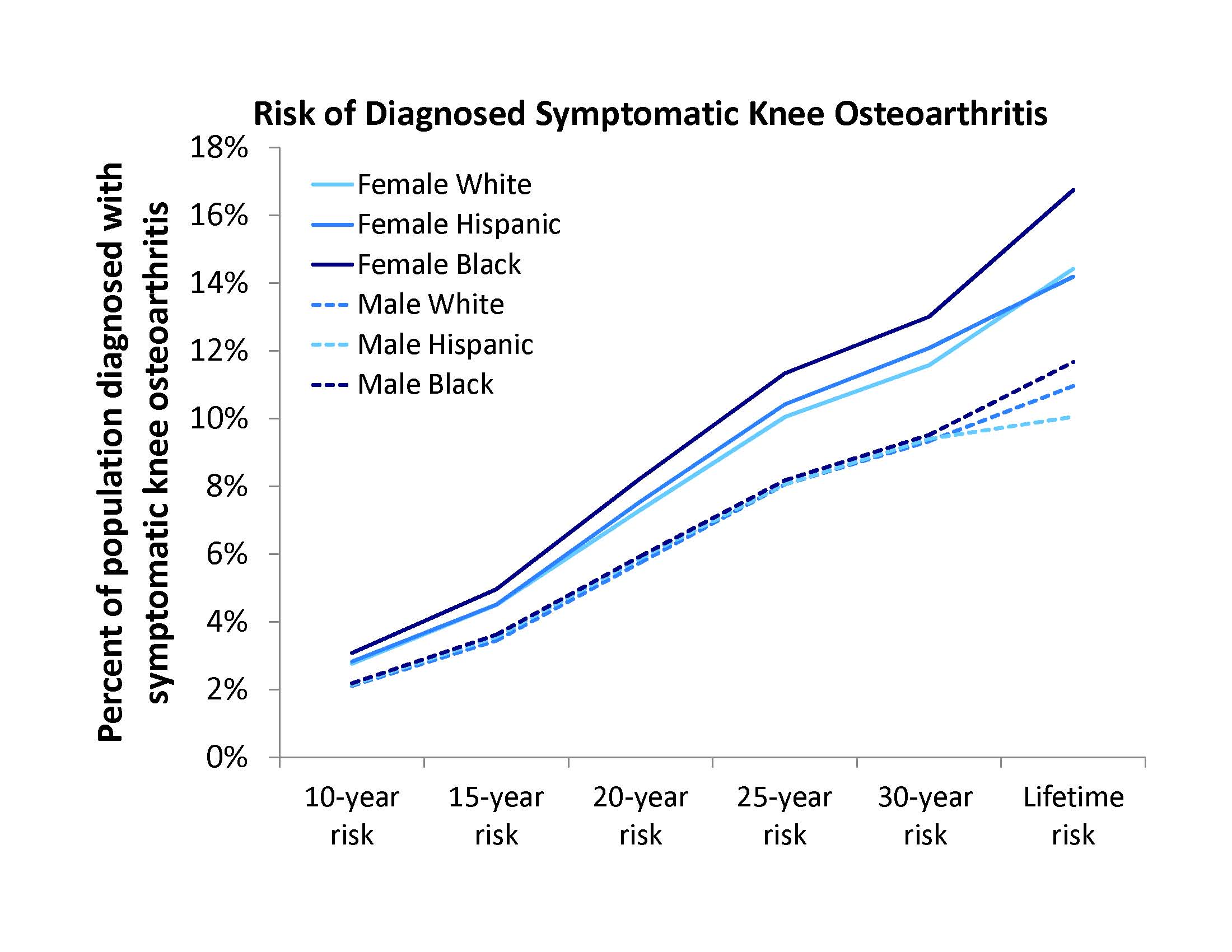Session Information
Session Type: Abstract Submissions (ACR)
Background/Purpose: A growing body of evidence suggests that females are more likely to be diagnosed with knee osteoarthritis (OA) and that obesity increases the risk of knee OA. Population-based studies suggest that Black and Hispanic females have a greater likelihood of being obese than White females. Sex- and race/ethnicity-specific risks of diagnosed symptomatic knee OA and the need for TKR have not been estimated.
Methods: We combined the OAPol Model – a validated state-transition, computer simulation model – with published data on the incidence of OA, stratified by sex and obesity. Obesity prevalence, stratified by sex and race/ethnicity, was derived from published literature and ranged from 19% for White males to 34% for Black females. The increased risk of symptomatic knee OA conferred by obesity was derived from published studies (RR = 1.7). Rates of progression of knee OA were derived from the Johnston County Osteoarthritis Project and calibrated to published data. The annual incidence of TKR among persons with advanced knee OA (Kellgren-Lawrence grade 3 or 4) was derived using data from two national longitudinal studies of persons with knee OA (Multicenter Osteoarthritis Study and Osteoarthritis Initiative). Input parameters related to mortality, obesity, comorbidities, non-surgical OA treatments, and implant failure were obtained from national survey data and published literature. Using the OAPol Model we estimated the 10-year, 20-year, 30-year and lifetime risks of diagnosed symptomatic knee OA and TKR from age 40, stratified by race and sex.
Results: In persons free of knee OA at age 40, the lifetime risk of diagnosed symptomatic knee OA ranged from 10% among White males to 17% among Black females (Figure). The 20-year risk of diagnosed symptomatic knee OA ranged from about 6% in males (race/ethnicity did not affect the rate meaningfully) to 8% in Black females. By age 65, 11.3%, 10.5%, and 10% of Black, Hispanic, and White females, free of knee OA at age 40, will be diagnosed with symptomatic knee OA (Figure). Lifetime need for TKR ranged from 3.8% for Hispanic males to 6.8% for Black females.
Conclusion: Lifetime risk of diagnosed symptomatic knee OA varies by age and race/ethnicity. Black females are more likely to be obese, which corresponds with their having the greatest lifetime risk of being diagnosed with knee OA and needing TKR. Race- and sex-tailored weight management programs may reduce the lifetime risk of knee OA.
Disclosure:
E. Losina,
None;
M. E. Daigle,
None;
S. A. Burbine,
None;
J. N. Katz,
None.
« Back to 2012 ACR/ARHP Annual Meeting
ACR Meeting Abstracts - https://acrabstracts.org/abstract/race-and-sex-specific-estimates-of-10-20-30-year-and-lifetime-risk-of-diagnosed-symptomatic-knee-osteoarthritis-and-the-need-for-tkr-in-the-us/

